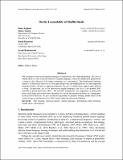On the Learnability of Shuffle Ideals
Author(s)
Eisenstat, Sarah Charmian; Angluin, Dana; Aspnes, James; Kontorovich, Aryeh
DownloadAngluin_On-the-learnability.pdf (173.1Kb)
PUBLISHER_POLICY
Publisher Policy
Article is made available in accordance with the publisher's policy and may be subject to US copyright law. Please refer to the publisher's site for terms of use.
Terms of use
Metadata
Show full item recordAbstract
PAC learning of unrestricted regular languages is long known to be a difficult problem. The class of shuffle ideals is a very restricted subclass of regular languages, where the shuffle ideal generated by a string u is the collection of all strings containing u as a subsequence. This fundamental language family is of theoretical interest in its own right and provides the building blocks for other important language families. Despite its apparent simplicity, the class of shuffle ideals appears quite difficult to learn. In particular, just as for unrestricted regular languages, the class is not properly PAC learnable in polynomial time if RP 6= NP, and PAC learning the class improperly in polynomial time would imply polynomial time algorithms for certain fundamental problems in cryptography. In the positive direction, we give an efficient algorithm for properly learning shuffle ideals in the statistical query (and therefore also PAC) model under the uniform distribution.
Date issued
2013-06Department
Massachusetts Institute of Technology. Department of Electrical Engineering and Computer ScienceJournal
Journal of Machine Learning Research
Publisher
Association for Computing Machinery (ACM)
Citation
Angluin, Dana et al. “On the Learnability of Shuffle Ideals.” Journal of Machine Learning Research 14 (2013): 1513–1531.
Version: Final published version
ISSN
1532-4435
1533-7928